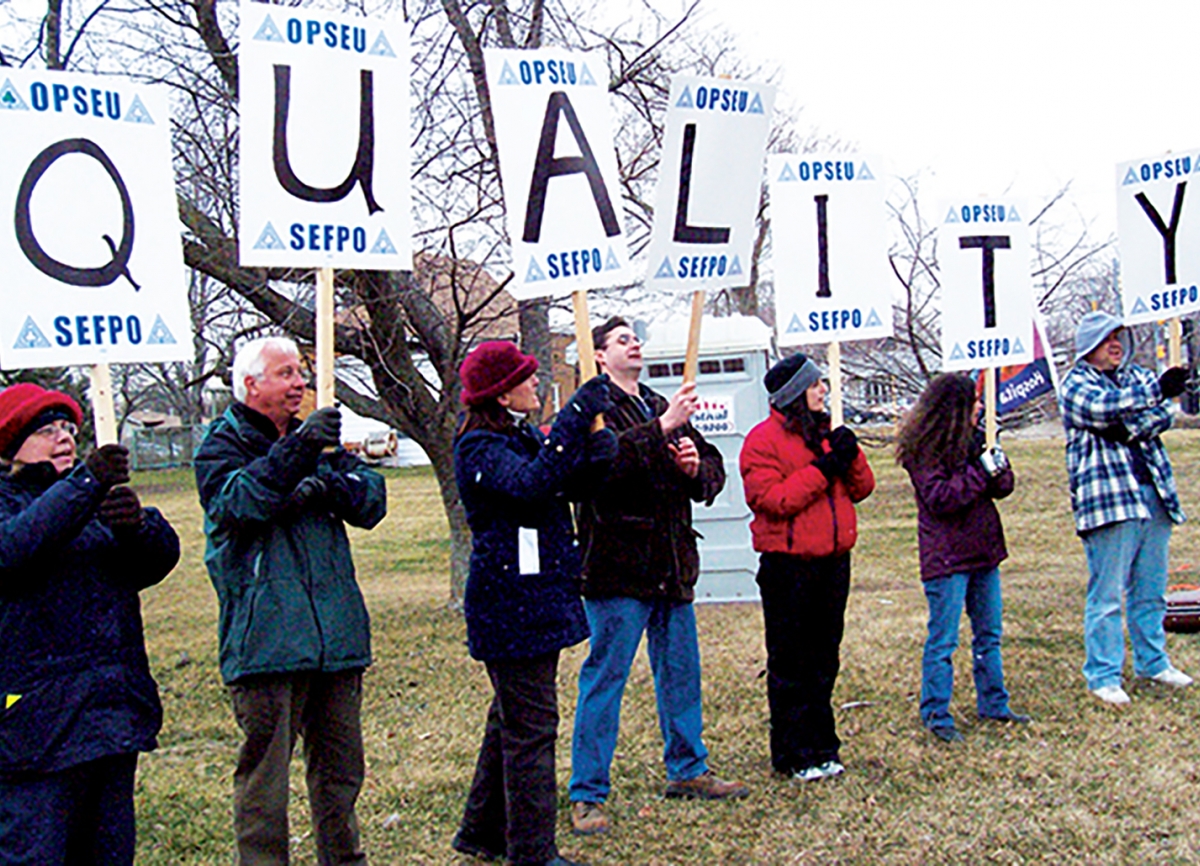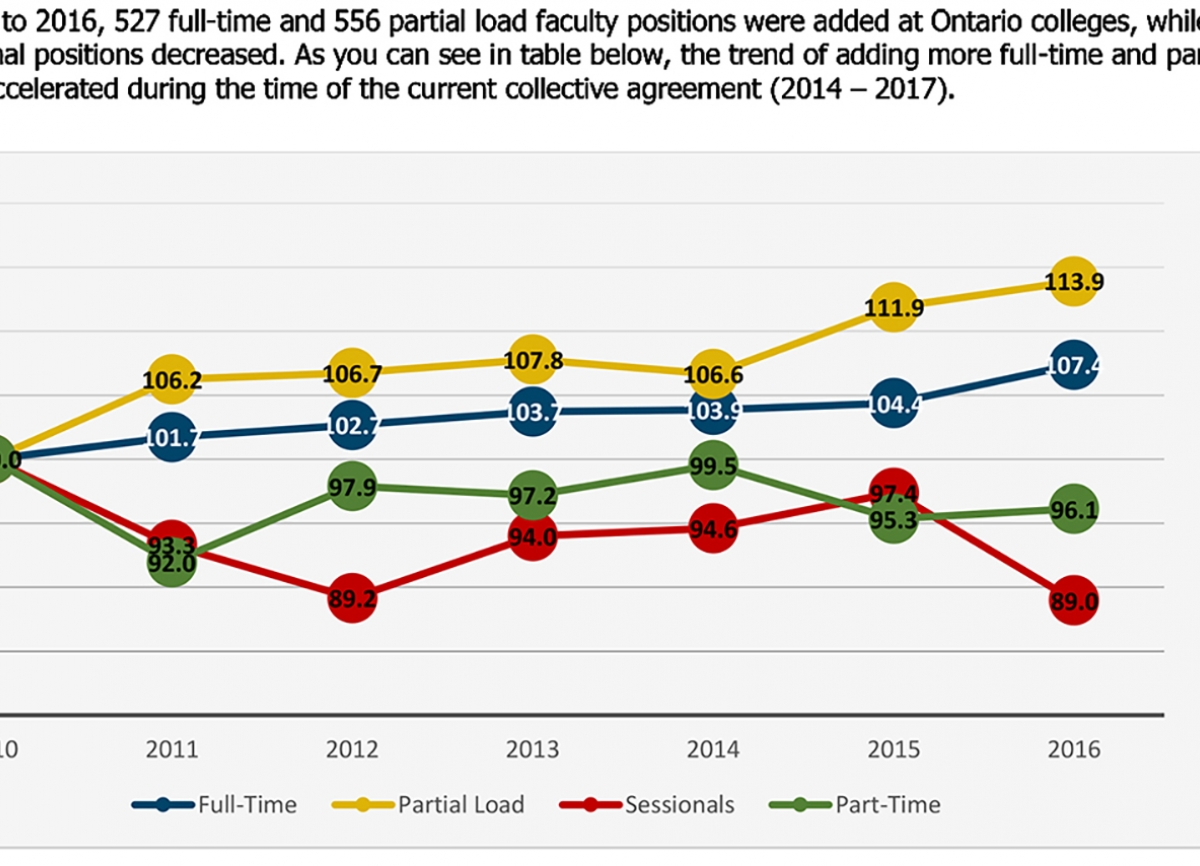
As the 2017-18 academic year gets underway, the threat of a work-stoppage by unionized faculty members at Ontario’s 24 colleges – St. Clair included – looms …
… But, on the bright side, unionized support staff have inked a contract extension of their existing deal, ensuring stability in that labour sector until late-2022.
Both faculty and support staff are represented by separate bargaining units of the Ontario Public Service Employees Union (OPSEU).
“Management” of the 24 schools is represented by the contract-negotiating College Employer Council (“the Council”).
FACULTY SITUATION
The current contract with approximately 12,000 professors is set to expire on September 30.
Summer-time talks between the two sides soured after just a few days of negotiations, leading OPSEU to request the appointment of a provincial conciliator to assist with the process.
One of OPSEU’s chief proposals was summarily rejected by the Council at the outset of the talks.
The union was proposing that the “oversight system” at all colleges should be revised to a university-like configuration: with a Board of Governors (composed of college and community officials) managing financial and operational matters, while a Senate (made up strictly of college administrators and employees) would deal with all academic issues.
Currently, Boards of Governors have decision-making responsibility for all of those topics.
The only college that currently features a Senate-like, “collegial governance” component for academic issues is Sheridan in the Greater Toronto Area.
The Council does not, necessarily, reject the value of the Senate idea … But it argues that it has nothing to do with terms-and-conditions of employment, so it cannot be incorporated into – or implemented by – the new contract with OPSEU.
It further notes that each of the 24 colleges is a separate corporation, so each would have to decide how to configure its administrative/oversight structure, with addition regulatory input from the Ministry of Advanced Education and Skills Development.
The initial few days of fruitless talks were followed in quick order by a request by OPSEU for the appointment of conciliator by the provincial Ministry of Labour, and then OPSEU’s scheduling of a strike vote by its members. That vote is now slated for September 14.
Then, in a very unusual move prior to the resumption of negotiations in late-August, the Council published its contract offer.
Such matters are usually kept confidential … But, in a press release, the Council stated that it was publicizing the details of its offers because the union had not “provided any information to its members about the 7.5 percent increase (over the four-year term of the proposed contract), the new maximum (salary) of $115,094, and other benefits with no concessions. We felt it very important to get the information out to faculty.”
The Council also urged that OPSEU should allow a full-membership vote on that offer prior to conducting a strike vote. The union rejected that idea.
Several mores days of talks in late-August did not ease the impasse between the two sides, meaning that the union will proceed with its strike vote in mid-September.
After the break-down of the talks in late-August, the Council alleged that the union’s demands (if implemented) would add $400 million annually to the operation of the two dozen colleges.
It added this, in a news release:
As a sign of good faith to avoid a strike, the colleges have extended the offer of settlement to September 29, so that we can reach a settlement before the contract expires on September 30. The offer of settlement provides:
• a 7.5 percent salary increase over the term of the contract;
• a new maximum salary of $115,094 will be in place by October 1, 2020;
• the 1.5 percent retroactive increase on April 1, 2017 is six months prior to the expiry of the current agreement, resulting in a retroactive payment of up to $800;
• a further lump-sum payment of $500 for full-time faculty and $250 for partial-load paid on October 1, 2017;
• expanded catastrophic drug coverage;
• positive changes to pregnancy and parental leave;
• no concessions.
The offer also provides that the parties will meet after the announced labour law changes (Bill 148) are implemented to determine how they affect the collective agreement, and allows for third-party arbitration if the parties cannot resolve any issues that arise.
If a strike occurs, faculty would lose the opportunity for retroactive wage increases and a signing bonus that are contained in the colleges’ offer for an early settlement. Every week that a strike continues costs a faculty member two percent of his/her annual wages.
If subsequent talks do not lead to a new contract, faculty could hit the picket-lines several weeks after the strike vote (that is, in mid-semester).
… MEANWHILE …
In a sort of out-of-the-blue development, OPSEU-represented support staffers obtained a contract extension a year before their existing pact was set to expire.
“Support staff” include such workers as technicians, clerical staff and maintenance personnel.
Their current contract was not set to expire until the end of August in 2018.
But very early talks led to a very early deal in the form of a four-years-long extension to 2022.
An OPSEU press-release saw union negotiator Janice Hagan describing the wage increases in the deal as “a significant win in this economic context. Not only does this deal provide 7.75 percent in wage increases over four years, it also delivers the first of these increases six months before the expiry of the current contract. And it does all this while ensuring absolutely no concessions for our members.”
Among the other terms of the new contract, according to the OPSEU press-release, are:
• Better job security. Members’ jobs will be protected by a new letter in the collective agreement requiring colleges to notify the local union about any intent to contract-out prior to a college entering into such an agreement; and
• Benefit parity with faculty. A “Me Too” clause will ensure that support staff receive any benefits improvements negotiated by unionized faculty in their contract bargaining sessions.
The contract extension was approved by union membership voting on August 29. An OPSEU press release noted:
Seventy-five percent of members backed the deal ...
… “I’m really excited about the contracting-out provisions in the new agreement,” said Janice Hagan, chair of the 10,000-strong College Support Division of OPSEU. “Right now, our contracting-out language saves people, but this new language is a step forward because it gives us an opportunity to save the work and save the jobs. That’s not only good for current staff, but for the next generation of workers as well. Stopping contracting out has been our number one bargaining demand for 20 years. This is the first improvement to contracting-out language in all that time, and I want to thank members for supporting it.”








